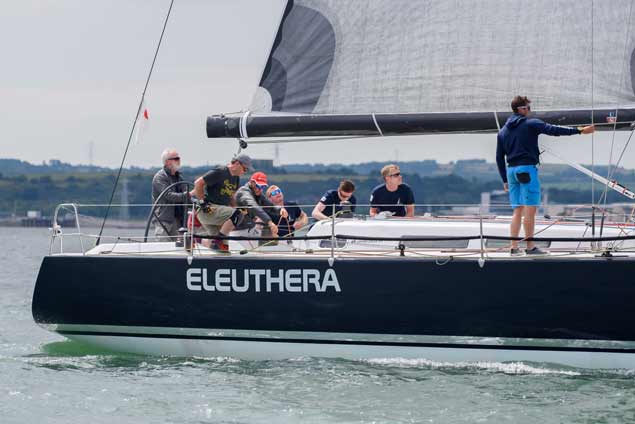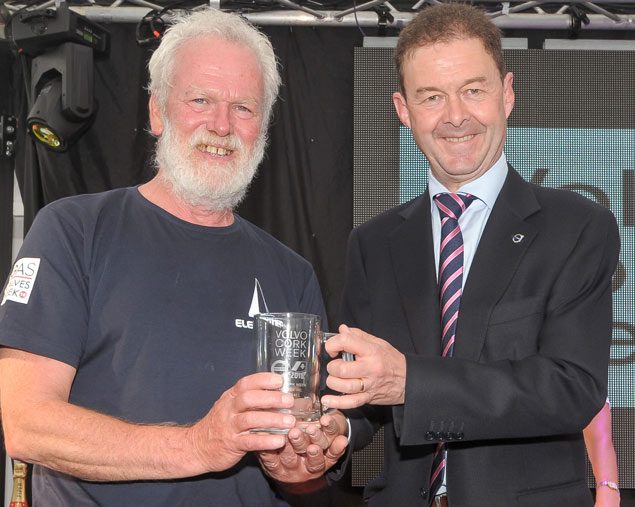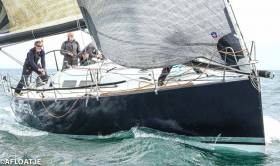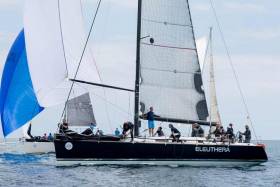Displaying items by tag: Frank Whelan
The Greystones-based Grand Soleil 44 Eleuthera (Frank Whelan) is a byword for enthusiasm, both for the dedication of her amateur crew in preparing the boat for the season, and in the way her owner/skipper and his top lieutenants lead them to success. This reached a new height at the end of June in the Sovereign’s Cup Regatta at Kinsale where Eleuthera achieved a clean sweep of five wins in Class 0 to emerge as the popular winner of the overall trophy, the Sovereign’s Cup itself.
Early 2018 season success in ISORA racing revealed the potency of the new Greystones Harbour Cruiser, Eleuthera. In its former life, this Grand Soleil 44 had a strong pedigree and skipper Frank Whelan and his young 11–man crew set about capitalising on this with straight wins on the Dublin Regatta circuit. But the County Wicklow crew knew that July's Cork Week and the biggest Cruiser One gathering of the season would be a tougher nut to crack. Here, Whelan describes how his high–handicap entry conquered Crosshaven last week.
Day three of Cork Week was our low point. Monday and Tuesday we had sailed well, but each had a mid-race reset due to loss of breeze, and then a building breeze at the end resulted in not being able to dig out the time gap we needed as a high–handicap boat. Wednesday, we again sailed well in a steady breeze and had the race in the bag coming onto the last leg, a long beat to the finish, which usually is a strong point for us. We did not execute that beat well and ended up down the rankings. We were lying sixth overall from nine.
"The team is a mad mix of ages (17 to over 60) and experience (3 years to over 40)"
We have a briefing on board Eleuthera before and after each race. And we were all thinking that our efforts to date had well repaid us for the work put in. Even those four weekends of training in the freezing howling winds of November had shown through in our racing to date, and one lousy leg doesn’t change that mindset. So the briefing coming out for the Thursday morning was focused on the fact that we hadn’t even reached the mid-point of the regatta, there were 3 races down, and 5 or 6 races to go. It was comfortable, we just had to win all of them. That might sound like a tall order, but at least it was in our hands, and we had some experience of doing it before, the last 3 regatta’s in Dun Laoghaire were 2 race affairs and we had a bullet in all 6, albeit that there was greater competition in Cork Week. The team is a mad mix of ages (17 to over 60) and experience (3 years to over 40), with almost all locals from Greystones, and despite the differences, we really gel together both on the water and in the festivities after.
 Eleuthera's core crew are Frank Whelan (skipper), Barnwell, Gary Hick, Conor Clery, Kevin O'Rourke, Killian Fitzgerald, Andrew Smith, Matt Sherlock, Gavin Laverty and Shane Hughes (North Sails Ireland) Photo: Bob Bateman
Eleuthera's core crew are Frank Whelan (skipper), Barnwell, Gary Hick, Conor Clery, Kevin O'Rourke, Killian Fitzgerald, Andrew Smith, Matt Sherlock, Gavin Laverty and Shane Hughes (North Sails Ireland) Photo: Bob Bateman
So, Thursday morning briefing was all about short race tactics, there were to be 3 that day, so clean starts is the primary goal, try to get out fast and in the right direction, then cover the fleet if you get into position to do so. There ended up only two races that day but we achieved the goal, two bullets. Friday morning strangely was exciting, but no apprehension, we were all just delighted to be back in contention, we were lying third overall. The same drill for the day and the reality of it was that we didn’t make any serious mistakes, three bullets.
"...but in truth, it is the craic we have as 12 disparate individuals who work together as a team..."
It kind of took a while for the win to even register, but it really is the result of a lot of things. Shane Hughes of North Sails Ireland has been training us since last November, and he is an uncompromising taskmaster, but we wouldn’t have achieved half of what we did without him! Paddy Barnwell’s attention to detail and management of boat prep and crew has been an eye-opener for me. Every member of the team gets out there and works on the hull sanding and polishing and general maintenance requirements, but in truth, it is the craic we have as 12 disparate individuals who work together as a team, slag and support each other in almost equal measure, and just enjoy it.
 Frank Whelan (left) receives his Cork Week Class One Trophy from David Thomas of Volvo Photo: David Keane
Frank Whelan (left) receives his Cork Week Class One Trophy from David Thomas of Volvo Photo: David Keane
If we hadn’t won it wouldn’t be quite as enjoyable, but it wouldn’t have been far off, we like sailing together.
Eleuthera's Cork Week Winning Crew
Skipper\Helm Frank Whelan
Nav\Main Paddy Barnwell
Tactics Daragh O’Sullivan
Main Andy Verso
Trim 1 Shane Hughes
Trim 2 Kevin O’Rourke
Pit 1 Gary Hick
Pit 2 Killian Fitzgerald
Mast 1 Conor Cleary
Mast 2 Matt Sherlock
Bow 1 Gavin Laverty
Bow 2 Andy Smith \ Brian Hare






























































